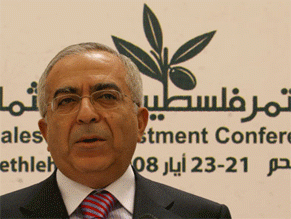|
World Jewish News

Salam Fayyad (photo by electronicintifada.net)
|
Fayyad: Palestinians won't be provoked to violence
26.02.2010, Israel Israel's plan to include West Bank religious sites in a Jewish heritage plan is a clear provocation but the Palestinians will not be dragged into violence, the Palestinian prime minister said on Friday.
Protesting at what he said was a politically-motivated move by Israel, Salam Fayyad attended Friday prayers at the Ibrahimi Mosque, or the Tomb of the Patriarchs, in Hebron, one of the sites included in the heritage plan announced this week.
The plan, which has triggered daily stone-throwing protests by Palestinians in the ancient city this week, has been described by Palestinian politicians as another obstacle in the way of U.S. efforts to broker a resumption of peace talks.
The United States said it had raised concerns with Israel about the designation of sites as Israeli 'national heritage sites', a U.S. State Department spokesman said on Thursday. Both sides should refrain from provocations, he said.
The United Nation's culture and education body UNESCO expressed its concern about Israel's plan and the "resulting escalation of tension in the area".
It was UNESCO's "long-standing conviction that cultural heritage should serve as a means for dialogue," a statement issued from the agency's Paris headquarters said.
The Hamas Islamists who rule Gaza have called for a new Intifada, or uprising, against Israel in response to the plan.
Fayyad, who heads a rival government in the West Bank, said: "We will not be dragged to violence by the terrorism of the settlers, and the terrorism of the settlement project."
"Our people understand all the dimensions of this political decision but they are determined to respond by building a positive reality on the ground," he told Reuters.
"This is what we call a quiet revolution," added Fayyad, whose Western-backed administration has set the goal of building the institutions of a Palestinian state by mid-2011.
A few dozen youths pelted Israeli soldiers with stones in a rain-lashed Hebron on Friday. The soldiers fired tear gas at the Palestinians, who were fewer in number than earlier this week.
Home to 150,000 Palestinians, Hebron is one of the most volatile cities in the West Bank. Some 400 Jewish settlers live in
heavily guarded enclaves in the city.
A Jewish settler shot and killed 29 Muslim worshippers in Hebron in 1994. In 1927, Arabs killed 67 Jews in the city.
The Palestinians want to establish an independent state in the West Bank and the Gaza Strip with East Jerusalem as its capital.
Peace talks have been at a standstill for more than a year. Israel and the Western-backed Palestinian Authority have accused each other of putting obstacles in the way of the resumption of negotiations sought by U.S. President Barack Obama.
Fayyad, speaking to journalists, described the Hebron shrine as an inseparable part of the lands occupied by Israel in 1967.
"Our objection to this lies in the fact these sites are on Palestinian land that was occupied in 1967, precisely the lands upon which the independent Palestinian state will be established," he said.
The Israeli plan includes Rachel's Tomb, revered as the burial place of the Jewish matriarch, near Bethlehem. The plan aims to restore 150 Jewish and Zionist heritage sites.
Israeli Prime Minister Benjamin Netanyahu said on Thursday the plan had been misunderstood "because there is no intention and no plan to change the status quo". He said Israel's intention was to preserve, not change heritage sites.
Fayyad said: "This decision clearly has a political dimension. Our people understand it on this basis.
Haaretz.com
|
|
